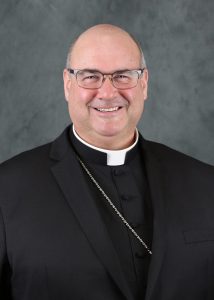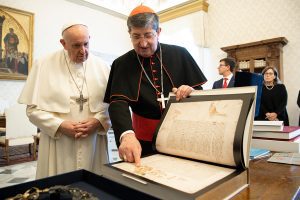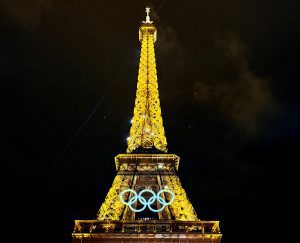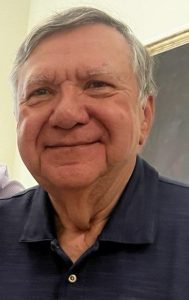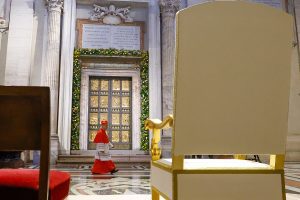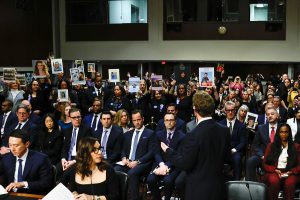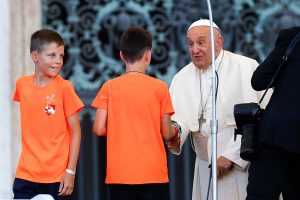(OSV News) – Among American Olympians achieving a spot on the podium in Paris are Catholics who have expressed their dependence on faith over the years as they’ve pursued excellence in their athletic pursuits.
Swimmer Katie Ledecky is outspoken about how her Catholic faith guides her life.

On Aug. 3, Ledecky became the most decorated American female gold medalist in any sport as well as one of only two women from any nation, in any sport, to win nine gold medals. It was her fourth consecutive Olympic gold medal in the 800 freestyle. She has 14 medals total. Just two days earlier she won her 13th Olympic medal — in itself historic. She took silver in the 4×200-meter freestyle relay.
After the 2021 Olympic games in Tokyo, the Catholic school graduate told the Catholic Standard, the Archdiocese of Washington’s newspaper, that she prayed the Hail Mary before each race to calm her nerves, just as she had during the 2012 and 2016 Olympics.
“My faith remains very important in my life, especially the last two years,” Ledecky told the Catholic Standard in 2021. She noted that watching livestreamed Mass, celebrated by her godfather Jesuit Father Jim Shea at a parish in Charlotte, North Carolina, helped her through the pandemic.
“My faith is strong, and I realized more how important that is,” she said.
Ledecky, 27, has nine gold, four silver and one bronze Olympic medals. In Paris, she is teammates with two fellow alumnae of her all-girls high school, Stone Ridge School of the Sacred Heart in Bethesda, Maryland: Phoebe Bacon and Erin Gemmell. Gemmell medaled alongside Ledecky with the 4×200 meter relay.
Ledecky and Bacon also attended the elementary Little Flower School in Bethesda, where both families are members of the parish.
They are among a host of U.S. Olympians who are Catholic, were raised in the faith, or attended Catholic schools or colleges and are now competing in Paris. Several have spoken in the past about the role their faith has played in their training and shaped their self-perception.
U.S. Olympic gymnast and Paris gold medalist Simone Biles, who was raised Catholic and in years past spoke about the role of faith in her life, has said she credits God for her success.
The high-flying 27-year-old, who trains in Spring, Texas, at her World Champions Centre gym, said in the past that when she travels, she sometimes takes with her a statue of St. Sebastian, the patron saint of athletes, and she also carries a rosary her mother gave her. Her parents have told media that they often pray the rosary for Simone. Biles and her family have also been known to attend St. James Catholic Church in Spring.
Biles, who won gold in the women’s gymnastics all-around competition in Paris Aug. 1 and helped lead the U.S. women to a team gold July 30, made those comments to Us Weekly in 2016.
“I never thought I’d be who I am,” she told Vanity Fair in a story published in January, “but look at God’s blessings.”
In recent years, Biles has been more private about her faith journey. In 2021, she diverged from church teaching on abortion access, saying on Twitter (now X) that she was “very pro-choice” arguing “you should not control someone elses body/decision.”
However, Biles has also been outspoken about addressing and prioritizing mental health, an issue the U.S. bishops have sought to raise with the National Catholic Mental Health Campaign. Following the pandemic-delayed Tokyo Olympics, Biles (a survivor of sexual abuse perpetrated by Larry Nassar, a USA Gymnastics’ national-team doctor) publicly admitted that she struggled with her mental health and athletics. At the time, she had stepped out of the Olympic competition after experiencing the “twisties,” a sense of disorientation when in motion that could lead to serious injury.
In Paris, however, Biles has exuded confidence — publicly thanking her therapist for routine care — and her dedication to her sport has paid off, with many calling her the “greatest of all time.” She is now the most decorated U.S. Olympic gymnast in history, with nine Olympic medals.
Ryan Murphy, a Catholic swimmer who grew up in Florida, is taking home a bronze medal in the men’s 100-meter backstroke. In a 2016 interview with the National Catholic Register, he described the importance of having an active prayer life and living out his faith. He said, “I’m a firm believer in God. My faith is important to me. There are, however, times when I rely on him more than others. Overall, I am private in my spirituality.”
Murphy, 29, drew the spotlight in Paris not only for his race, but for the sign his wife, Bridget, held up as he was walking to the podium: “Ryan it’s a girl!” The couple, who married in September, are reportedly expecting their first child in January.
A former altar boy, Murphy described his family to the Register as ardent supporters of Catholic education. The story described him as having “a great devotion to St. Christopher, the patron saint of swimmers.”
He garnered attention during the 2016 Olympics in Rio de Janeiro — where he won three gold medals — after genuflecting following a swim.
“I believe God has given me a great talent, for which I’m eternally grateful,” he told the Register at the time. “My faith gives me comfort despite the outcome of a race. I ultimately believe — I know — God has a larger plan for me.”

